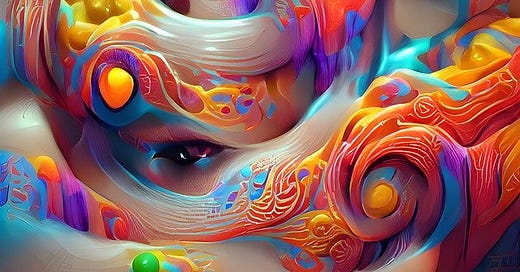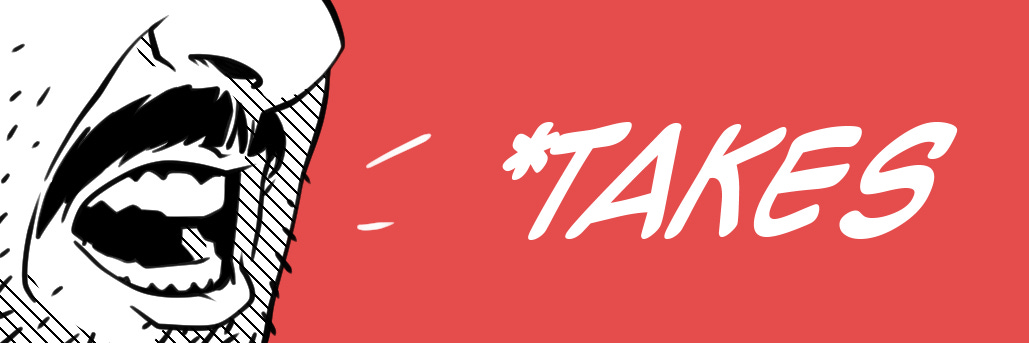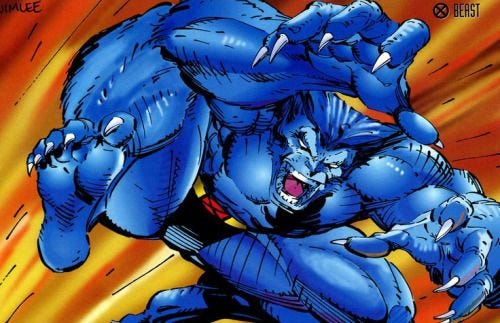TAKES: Is there an upside to AI art?
"First the robots came for the artists, and I did not speak out (because I could use the robots to finally make my comic ...)"
This content was initially published in a very rough draft as a thread on Twitter. I’ve tidied it up, added to it, and am re-publishing it as an essay here.
It didn’t really seem to drum up a lot of interest, so I thought I’d try to start a discussion here instead and see what happens.
Thanks for playing along.
Big reminder folks that if you like this post, hit the ❤️ up there to let me know, or leave me a 💬 down below, I’d love to hear from you.
Hey fellas — I want to throw in my two cents about the AI-generated art controverseh that is eating up attention / dreams on Comics Twitter right now.
If you’re unfamiliar with the issue, the potted version is this. There are programs where you can type in a couple of keywords, and the program will then generate an image based on those prompts.
This kind of program can be used to make GIFs, short videos, and “paintings,” and it’s not at all inconceivable that you could use an AI art program to create an entire graphic novel in a very short amount of time.
In fact, that market is growing as we speak.
Here’s a video tutorial showing how it’s done. Skip around a bit and you’ll see why so many artists are freaking out:
I’m not going to try and move the needle here. The battle lines have already been drawn, the draft already took place, the soldiers are already at the front. You’re either pro-human artist or pro-hurting human artist.
Instead, I want to pull fellow artists to the sidelines of the war for a quick thought experiment. And that is the all-too-valuable and lost art of asking oneself, “is there any way in which my enemy is right?”
Specifically, can we as artists imagine any use cases for this technology that we would widely agree are complimentary to what we do, that we would deem acceptable, that we may even consider a net benefit?
I’d like to propose a hypothetical use case to test that question. I’ll confess that I’m not totally sold on what I’m about to propose myself, but I do think it’s worth thinking about.
First, some throat clearing.
The ‘to be sure’ section
I broadly accept and even agree with most criticisms of the AI art trend. Even the most hostile reactions, which essentially all boil down to "this isn't fair to artists."
I agree. It's not fair.
We spend tedious years cultivating an analog ability to appropriate foggy concepts born in our imaginations into cartoons for others to experience and (hopefully) enjoy.
There’s something impressive about that. Something that shouldn’t be mothballed by innovation, or convenience, or the march of technology. Hand-crafted furniture assembled by a master carpenter is more impressive than a blue plastic Adirondack chair from Target. We all buy the $10 substitutes, and Target indeed makes oodles of lettuce from them. But none can deny that those chairs are simply that: substitutes for the real deal.
I don’t think AI artists can claim to have earned that. They don’t have the kind of artistic ability that requires years of sacrifice, discipline, and indeed, incredible discouragement, grit, and willpower to achieve. It might take you 5 to 10 years to become a competent artist, even if you have “natural ability.” It looks like you can learn how to produce pretty decent AI art in a matter of hours.
And don’t waste our time trying to justify or argue this point. Even if it takes months to master the nuances of the prompting, you are still falling years short of a mediocre concept artist. I’m willing to swallow some tough truths about AI art, and I ask you to do the same in good faith. Let’s be honest.
But let’s also be generous and concede that maybe AI Artist A is capable of producing better images than AI Artist B, and this is due to some kind of talent or skill, the same way Traditional Artist A is great with watercolors and Traditional Artist B sucks with watercolors, but is great with charcoal.
This is important to concede, because it gives context to my next point, which is that I also agree that there are lots of no-talent assholes bragging that they can program AI to mimic real art and thus put real artists out of business.
It seems to me that a lot of the contention over AI art is really a contention over the attitudes of some AI artists. These aren’t people who are showing up to say “hey, I belong here, too.” They’re showing up to say, “even though you have made every payment on time, nonetheless, we are here to repossess your home, ha ha, ha ha ha ha ha, you suck.”
These artists are the kids who bring the cheat codes to the arcade; who want to buy popularity instead of earning it. They haughtily brag that by entering “trending on ArtStation” or “like Alex Toth” they’ve discovered a way to make artists irrelevant, without a whit of self-awareness that without whatever is trending on ArtStation, or Alex Toth, they’d have nothing to feed the AI.
This is like saying farmers are irrelevant because you buy your produce at the store.
Those guys are assholes. If you’re one of them, grow up a little, champ.
Now, I’ll admit, I'm somewhat less threatened by the AI art trend thing than a lot of my peers.
Reason one is that there's still a sort of "uncanny valley" we can all see with even the best examples of AI art. It just doesn’t look … quite right, does it?
Now, it’s entirely possible that this is an iterative problem that will be moot in a few years (maybe even a few months). That someday, someone will type “X-Men, Beast, jumping, Jim Lee, 90s style” into MidJourney, and voila, the AI will produce something indistinguishable from, well … the Real McCoy, here:
Maybe one reason I’m less worried about AI art is that I fall a little more on the side of the futurists who argue that AI is not meaningfully going to be able to compete with human intelligence for a long, long time (please feel free to look up debates on the topic, it would be too exhaustive and technical to attempt to reiterate here, and I am only a humble artist).
The point is, I don’t think we need to worry about whether AI art can really grok human art when it can’t even grok humans.
Sure, the marriage of AI generation and a savvy human art prompter puts some human artist careers in danger. But in terms of art as a human pursuit, I think our human intuitions will protect us more than we think. I think we want the Real McCoy.
Maybe that’s naive or saccharine, but I do believe it. And anyway, I reserve the right to change my mind at any time.
Reason two for not feeling super threatened by teh machines: I've conceded before that I do see some positives in AI art as a tool for writers.
I know many who have had difficulty finding reliable collaborators and have spent time, health, and small fortunes on projects that go nowhere. Hell, I myself was one of them once upon a time. I spent 5 years trying to launch a comics career as a writer before deciding “fuck it, I will learn how to draw.”
Not every writer can do that. And yet, they still have stories to tell. And they still want to build a portfolio. AI art generators are a tool that can help them do that.
Consider too how writers could use AI art generators when collaborating with flesh and blood artists.
We’ve all been in a situation where we’ve had to make “just a couple of hopefully small changes” to first-draft thumbs or pencils because we misinterpreted what the writer wanted (or they just sucked at telling us in the first).
But what if the writer had a tool to communicate a rough vision of a thing to you, cutting out all that annoying back and forth and keeping the project running smoothly?
That right there seems to me a completely inoffensive hypothetical use case. But it’s not the one I want to contemplate here today.
My hypothetical use case for AI art that artists might be okay with
Instead, think of a comic or manga artist with a long-running project that is left incomplete upon their death (shouldn’t be that hard; we, unfortunately, have some fresh examples).
When an artist’s magnum opus is left unresolved like that, there are few remaining options, and none of them are good:
Leave the work unfinished, to the infinite imaginations of its heartbroken fans
Hope the creator left enough notes behind so that someone can take over
Let someone new take over completely and do their own thing with it
But what if you could feed the hundreds (or thousands) of pages from 20-some years of an artist’s output into an AI, and teach it to mimic that artist’s style? Then, if you’re lucky enough to have some scraps from #2 up above, fill the gaps and create something that approximates a conclusion?
Maybe the mere suggestion is anathema to you. Deepfake Bruce Willis selling Russian Vodka feels gross, even with his alleged blessing.
But from the outset, I think it would be understood, by fans and even by the deceased artist’s estate, that we’re not trying to complete the artist’s original vision. That ship has sailed to the Undying Lands, never to be seen again.
No one but the OG can know how the story beats were to materialize, what specific words would be woven into dialogue, or what nuances of expression and form are chosen in the panels.
That might be the definitive way in which we artists are utterly, and forever, irreplaceable.
But here’s the rub: I think we already cross whatever ethical line you’d be worried about with AI in two of the three options listed above. What’s more, none of the three constitute the artist's complete vision.
Thus, I could see an argument for an AI-assisted completion of unfinished work being a viable option #4.
I’d go further to say it might be the best of the bad options.
Why?
The two human solutions have the same problem: humans.
(Stick with me here.)
If you let another human take over, whether to execute their own vision, or to attempt to complete the original artist’s work through sophisticated mimicry, I think you inevitably end up with a lot of the replacement artist’s interpolation in the project.
Said another way, the new artist can’t help but make the project their own.
This isn’t some flaw; this kind of creative individualism is an inherent advantage for humans in the human vs. robots epic.
But if your goal is to create a convincing replica of another artist’s work, then I don’t think you can rely on a human for that.
I think you need a robot.
Something that can take orders, process 10,000 images, and copy.
To create something truly original and innovative, and maybe most importantly, creatively individual, you need a weird, neurotic milk sucker like you or I.
To create an unsentimental facsimile of a weird, neurotic milk sucker with limited creative interpolation or deviation, you need AI.
Why do this at all, though?
Because for long-running fans, it gives something I think everyone can agree is a net good: a sense of closure.
We all know the product is a facsimile, and the real thing would have been better.
But it’s a use-case solution that at least touches toes with the original artist. The AI is literally taught by the artist, in a way, not to be an artist, but to be the artist. It gives you something like what the artist might have done, and probably better than a human could.
The end is n-AI
Let me be clear that I am not saying that artists should knuckle under, join the revolution, "can't beat 'em, join 'em," or anything of the sort here.
AI art is new. It will probably hurt some commercial artists permanently. And it might be a passing trend, like NFTs, that never really finds much purchase in comics and other artistic quarters. And who knows how it will be regulated.
I feel pretty confident that human artists win the day here, and not just in some sort of existential Pyrrhic victory kind of way.
No matter what happens, nothing will ever stop me from doing what I do. Because I'm a human, and humans are gonna human.
But assuming we’re in a timeline where this thing doesn't go away, and actually becomes a tool that doesn't crush us, but that we innovate around and find ways to use to our advantage, well… what are the possibilities we can imagine?
*The thumb comes courtesy of AI artist ARTVIZUAL via Pixabay






